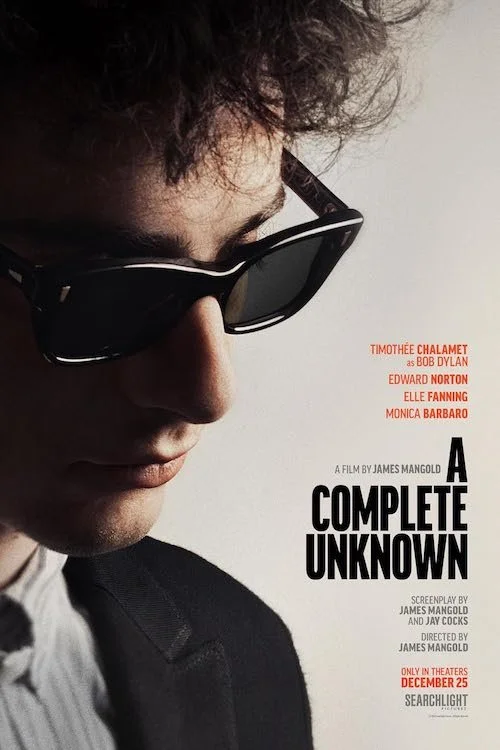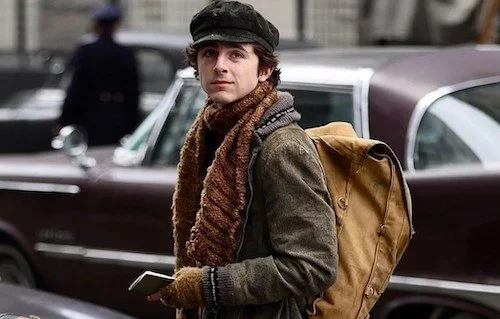A Complete Unknown
Written by Andreas Babiolakis
When Bob Dylan — the greatest songwriter of modern times, but also a notorious recluse and stick-in-the-mud — gives his blessing to a performance of a younger version of him in a biographical picture, I take notice. That’s precisely what happened when Dylan shouted out Timothée Chalamet, who has been preparing to play the famed musician for years. Let’s be honest here: that was the biggest draw for A Complete Unknown from the jump: to see a great performance of Bob Dylan. However, it would be nice if the rest of the film mattered as well, because watching a film for literally one performance is just silly. James Mangold — a director who is fairly inconsistent but is capable of the riches in the second syllable of his surname from time to time (see 3:10 to Yuma and Logan, for instance) has made a biopic that at least tries to not be a traditional one that covers a subject’s entire life in a healthy two hours. A Complete Unknown features two key eras: the start of a young Dylan’s career as a traveling singer-songwriter, and the kick-off of his infamous electric period. Having said that, Mangold still relies on typical biopic tropes enough that A Complete Unknown doesn’t soar like it easily could.
Dylan — né Robert Zimmerman — travels to a hospital in 1961 to meet his ill idol, songwriter Woody Guthrie; he finds folk activist Pete Seeger (Edward Norton) there, who takes in the traveling Dylan after hearing the budding musician’s original song being performed to Guthrie. Seeger has an ear for talent and recognizes it instantly in Dylan, who is twenty at the time. While being supported by Seeger and performing small folk shows, Dylan meets Sylvie Russo (a character essentially based on Suze Rotolo, but the real Dylan asked for this name change). Russo (Elle Fanning) takes an instant liking to Dylan, and they kick off a relationship while taking care of one another. Meanwhile, Dylan is competing with fellow folk musician Joan Baez (Monica Barbaro) who is selling more records than he is, likely because of her refined, gorgeous voice; Dylan is rough around the edges but authentic. Once Russo goes on a twelve week long academic trip and the United States is given yet another Cold War related scare, Dylan and Baez romantically link; it’s as if the world was ending, and they also speak each other’s language (or so they think).
Both Russo and Baez push Dylan as an artist. Dylan isn’t selling many albums because he is being forced to record mainly cover songs; Russo keeps reminding Dylan to play his original songs. Meanwhile, Baez enjoys covering Dylan’s work, like “Blowin’ in the Wind,” which helps bring him to a wider audience; they begin to collaborate more frequently. However, Dylan slowly realizes that he prefers being a lone wolf — like the years of him traveling and playing by his own rules — which is made abundantly clear once he develops a fan base who won’t leave him alone. Between the pressures of his relationships (including the fact that he’s carrying out an affair), the limitations of his record label — especially by iconic manager Albert Grossman (Dan Fogler) — and the expectations of both fans and the folk scene, Dylan revisits a love he expresses earlier: rock music. He teases a rebellious electric era, which reads as bad news to his label, to Seeger, and to the folk circuit. It may be his only way to become alienated again. Is this what he truly wants? He’ll find out.
A Complete Unknown has trust issues with its audience, but at least it rightfully honours the music at the forefront of this biopic.
I feel like Mangold doesn’t trust his audience enough, as A Complete Unknown has to remind you of certain facts more than once. The fact that Dylan wants to play with electric instruments, for instance, feels heavy handed; the idea that it is irregular to go electric within folk music (for that time period, anyway) is mentioned at least half a dozen times, just in case you forgot. In that same breath, Mangold and co-screenwriter Jay Cocks sprinkle little Easter eggs all over A Complete Unknown, including a warning for Dylan to be careful with his signature motorcycle (an allusion to the eventual accident that would change his entire life), and the frequent featuring of John F. Kennedy’s presence and assassination (which, to me, feels like a nod to Dylan’s coveted epic late into his career, “Murder Most Fowl”). Still, A Complete Unnown spoon feeds its audience too frequently for the film to seemingly exist on its own merits. It’s fine to shed light on information that some audience members may not know. It is condescending to insist that your audience may not be smart enough to put two-and-two together.
Having said that, A Complete Unknown is a treat for fans of sixties folk music (yes, including the electric kind), and for Bob Dylan aficionados (who may already know everything that is shown in the film, but will get a kick out of the performances nonetheless). Seeing the hard work Chalamet, Norton, and Barbaro put into their performances (and, believe me, there are numerous, so they learned quite a few songs each) pays off with some engaging sequences of folk legends finding magic and inspiration within one another. Chalamet is especially strong as Dylan, seeing as he never feels the need to explode to sell any scene, no matter the context. If anything, he just skulks around, with his head dangling low and his voice always kept to the volume of a heavier breath (unless he is singing his heart out, of course). If you look at A Complete Unknown as a hit-by-hit recollection of Dylan’s early career, it is a loving tribute to a complicated figure, which makes it worthwhile for certain audiences. If you thought that an atypical artist would get an unorthodox film, you may be mistaken. Still, A Complete Unknown is sincere and well-intentioned enough that its runtime zips by and you will leave with a full heart and a head stuffed with some of the best songs of the sixties folk movement.
Andreas Babiolakis has a Masters degree in Film and Photography Preservation and Collections Management from Ryerson University, as well as a Bachelors degree in Cinema Studies from York University. His favourite times of year are the Criterion Collection flash sales and the annual Toronto International Film Festival.






